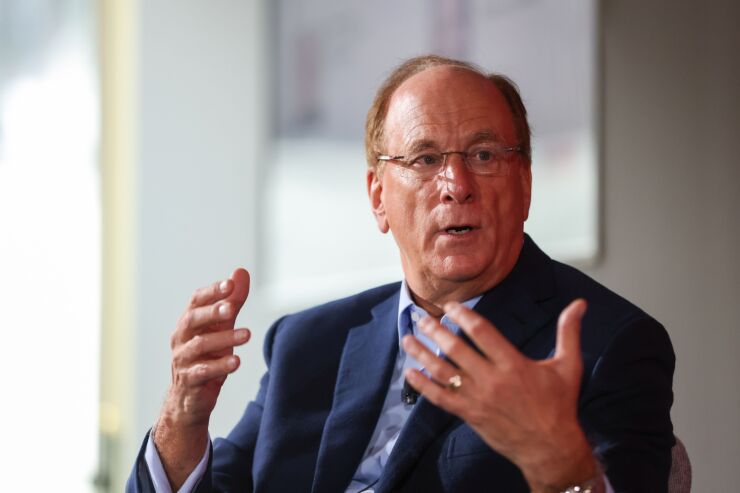Despite a barrage of Republican attacks, lackluster returns and diminishing client interest in the U.S., BlackRock has been quietly expanding its dominance in ESG investing.
The world's largest asset manager has posted net ESG inflows every quarter for the past two years, a period that marks one of the toughest ever in the two-decade history of environmental, social and governance investing.
In all, BlackRock's ESG-related assets under management swelled 53% from the beginning of 2022 through the end of last year, according to data provided by Morningstar Direct. Over the same period, the wider ESG fund market grew only about 8%. The money manager now oversees roughly $320 billion of ESG funds, more than any other investment firm in Europe, the U.S. or globally.
BlackRock declined to comment on the figures, which are based on Morningstar's own assessment and exclude excludes money market, feeder and funds of funds. According to the firm, BlackRock manages more than $800 billion using its sustainable investing platform, and integrates what it considers to be financially material ESG data into firm-wide investment processes.
"BlackRock has been the biggest contributor of inflows into ESG funds over the past five years, including the past couple of years," said Hortense Bioy, the global director of sustainability research at Morningstar. And that's "despite the ESG backlash in the U.S."
READ MORE:
That backlash has been increasingly aggressive, as the Republican Party seeks to characterize ESG as woke, anti-capitalist and even anti-American. BlackRock has often found itself at the receiving end of ESG-related outrage, prompting CEO Larry Fink to declare the label too "weaponized" to use. That followed warnings in which he said the debate around ESG had become "ugly" and "personal."
"We can expect the ESG backlash in the U.S. to continue until the election," Bioy said. "And perhaps also beyond, depending on the outcome of the election."
There are also prominent voices within the finance industry lashing out at ESG. In a recent post on X, the billionaire investor Bill Ackman accused the "ESG movement" of having "caused enormous harm." He pointed to "divestment in nuclear and carbon-based energy, and to our defense companies" as examples that, according to Ackman, have hurt American energy independence, weakened defense capabilities and even harmed the environment by shifting production to other markets.
To complicate the narrative for ESG's proponents, the macroeconomic forces that have prevailed since the end of the pandemic, including high interest rates, have proved a poisonous cocktail for many of the green stocks that usually fill ESG portfolios. Last year, the S&P Global Clean Energy Index slumped 20%, whereas the S&P 500 rose 26%, including reinvested dividends.
But ESG is more than just wind and solar. The three BlackRock funds (tickers: ACSEUX3@LN, EEDS@LN and ACWEIXG@LN) that saw the biggest asset growth last year, according to Morningstar, all counted Microsoft and Apple as their two biggest holdings.
In the U.S., according to Morningstar estimates in September, the most popular ESG strategy is one known as climate transition, which is supposed to dedicate capital to making not-so-green assets greener. The climate-transition fund that attracted the biggest inflow is BlackRock's iShares Climate Conscious & Transition MSCI USA ETF (USCL@US), whose top holdings are Nvidia, Amazon and Microsoft.
The wider ESG fund market, meanwhile, suffered a stinging blow in the final three months of 2023 with the first-ever net client outflows. The retreat was led by the U.S., where redemptions were too big for European inflows to offset.
As the global fund market lost $2.5 billion of ESG client cash last quarter, BlackRock had net inflows of $4.7 billion, led by its European business and index-tracking strategies, according to Morningstar. BlackRock saw $5.6 billion in new money flow into passive ESG strategies, more than making up for the roughly $900 million that flowed out of active strategies, net, Morningstar said.
For ESG globally, index-tracking investing is starting to supplant active management. Even in Europe, the biggest market for ESG investing by far, the trend was striking. Passive ESG funds brought in $21.3 billion last quarter, while clients in actively managed ESG funds withdrew almost $18 billion, according to Morningstar.
BlackRock's share of the market
The development is all the more noteworthy because ESG was always supposed to be uniquely suited to active management, due to the extra layers of analysis thought to be required to screen for things like climate and biodiversity risk.
Bioy said the latest flow figures show the "disappointing reality" that managers pushing active ESG strategies "failed" to prove to clients that they should be entrusted with their money, despite sitting in a "corner of the market where it's easier for them to prove their worth."
For now, active ESG strategies continue to exceed their passive counterparts in both Europe and the U.S. But the latest flow data suggest that dynamic may shift. Morningstar notes that 85% of BlackRock's ESG fund products are now in passive strategies. Meanwhile, Bioy points out that BlackRock's growth in ESG has coincided with a decline in the number of ESG resolutions it supports.
In Europe, competitors are taking note. Amundi, Europe's largest investment manager and the world's No. 3 in ESG, targets having 40% of its index-tracking ETFs become ESG products in 2025. At the end of last year, that ratio was 33%.
Ultimately, the "disappointing" results produced by active ESG managers have "compelled investors to shift to passive, low-cost" strategies, according to Morningstar.
— With assistance from Sheryl Tian Tong Lee.






